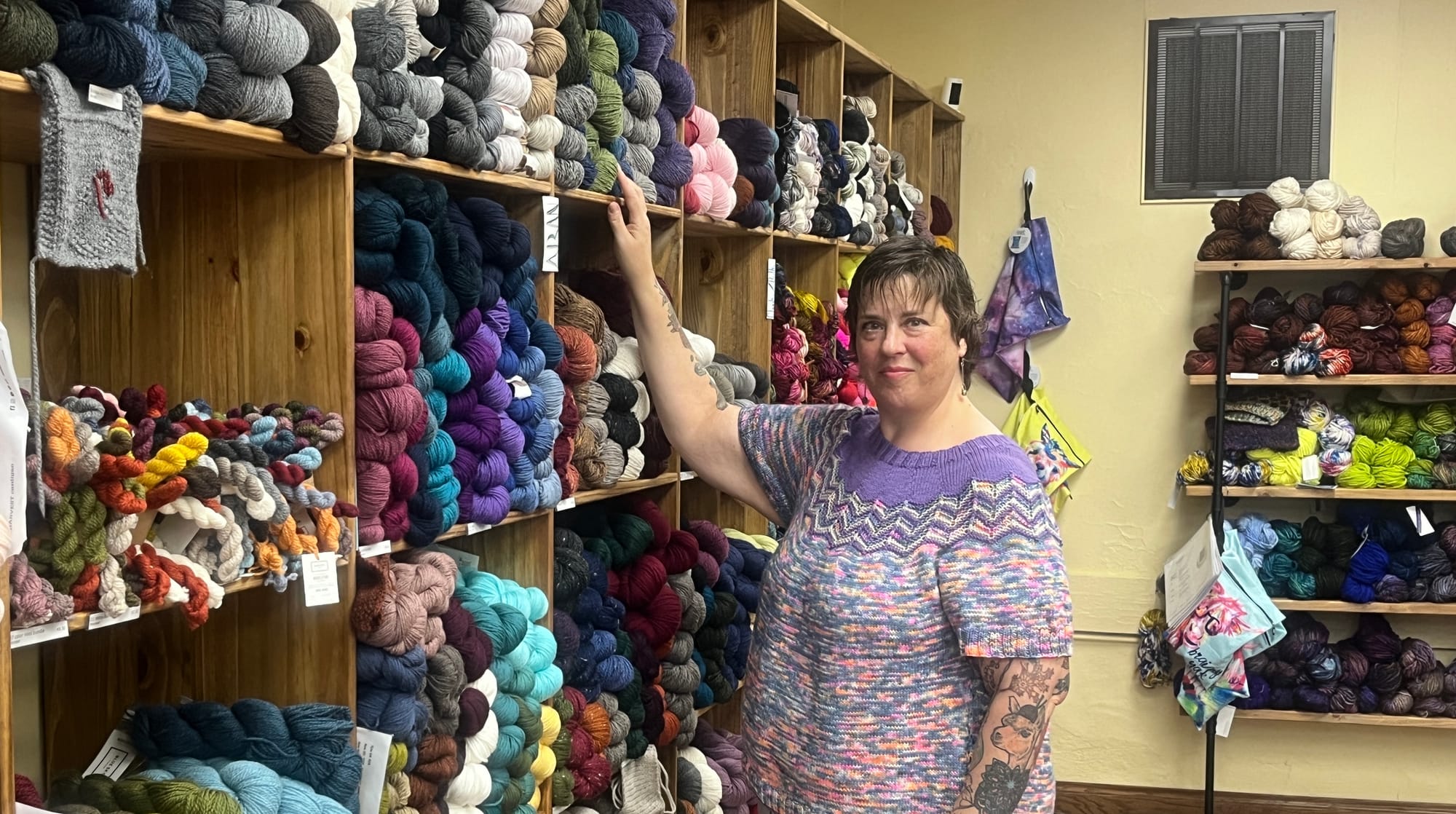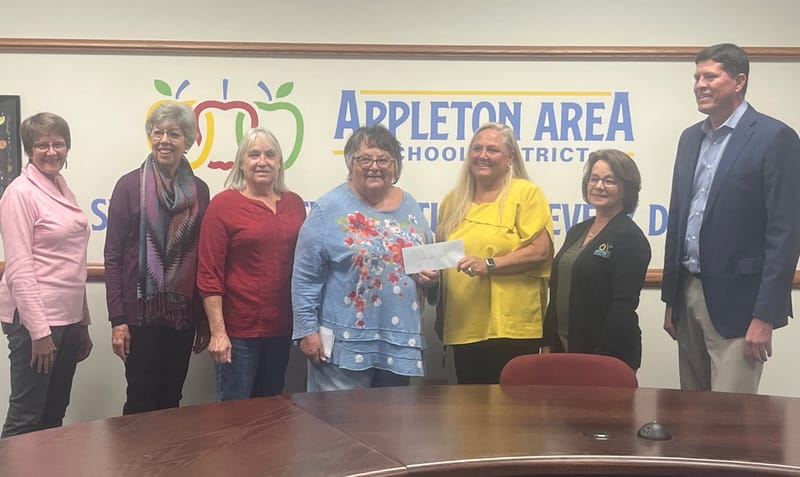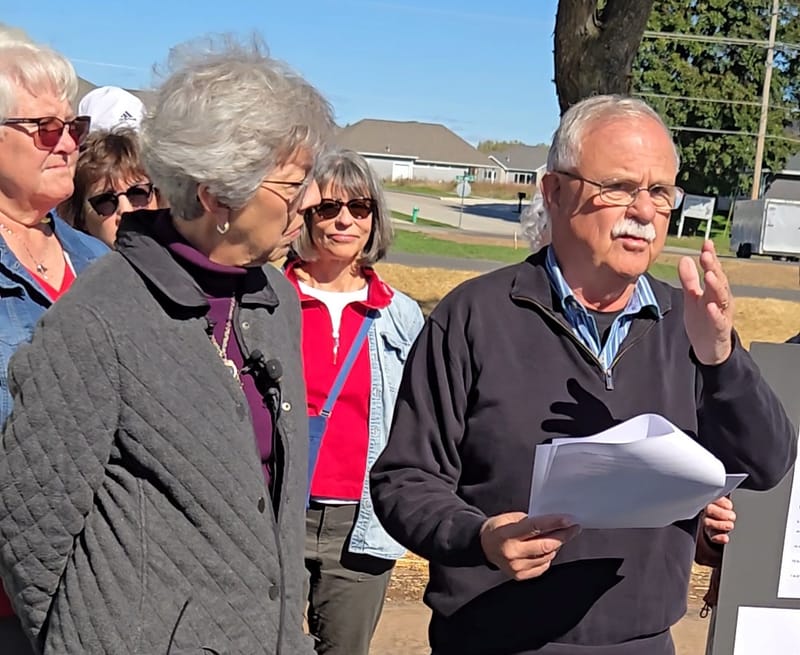Tariffs threaten sense of community that 'Casting On' has always strived to foster
Owner says it's hard not knowing if the order you put in is going to ship before the next tariff hits. Or whether it will ship at all
To open your own small business is to court uncertainty.
Sara Rabideau certainly understood that back in 2018 when her wife, Sam, floated the idea of opening a yarn store in Appleton after the only one in town closed its doors. As a crochet hobbyist – but by no means, an expert – she met the idea with bemusement, if not outright skepticism.
“Like, oh right, ‘I’m a nurse and you’re a business analyst,’” she recalls telling Sam. “What do we know about opening a yarn store? So I told her she was crazy.”
But the idea intrigued her, meaning the uncertainty was just beginning: finding a location; learning how the wholesale and retail world worked; understanding marketing and inventory control; turning an empty building into retail space ... and a hundred other things. This didn’t account for the physical labor of stocking an empty store, installing proper shelving or determining the general design.
Then, less than a year-and-a-half after she opened Casting On near the corner of College and Durkee, Covid hit, ushering in a whole other level of precariousness and unpredictability. Because Rabideau had bills to pay and because she had already quit her job as a Registered Nurse, she found a way, navigating the tricky straits of retail during a pandemic and finding a way to survive.
Four years after the world re-opened, Rabideau’s business is brisk, her clientele steady and established, her location settled in the heart of downtown Appleton tucked up against the brand new Trout Museum on College Avenue.
'It's really hard not knowing'
So she was not anticipating the latest round of uncertainty, over which she has even less control than all that came before. And it has her deeply concerned. President Trump’s on-again, off-again, now, apparently, on-again tariffs have left her guessing what comes next, from what product will be available to what the cost will be to should she be ordering right now to get ahead of the levies to how much of the higher costs will she be able to absorb to whether foreign countries will any longer even be shipping to the United States at all.
“I mean, it’s really hard not knowing,” Rabideau says. “It’s hard not to know if the order you put in is going to be shipped in time before the next tariff hits. I was going to order this latest thing out from one of my suppliers in Spain – this beautiful, beautiful yarn – and it’s not coming out until October. The rep from the company e-mailed me last week and said because they don’t know if the tariffs will be in effect then that I could place my order now and get it pre-tariff.
“The problem is I’m now having to buy inventory a month-and-a-half ahead and it’s a lot of funds to be tying up in something I can’t even sell yet.”
Rabideau says the same thing applies to needles and hooks, most of which come from China and India – two countries hit with the most punitive tariffs. Once again, Rabideau has to guess how many she should buy, how much more money she must tie up in inventory in a business that operates on small margins and doesn’t necessarily have a lot of liquidity.
“It’s hard to play the guessing game,” she says. “If a designer sends out the latest coolest thing that everybody’s doing and you say, ‘Cool, cool.’ But you don’t know if you’re going to have the right yarn or the right needles. How do you prepare for that? You’re scrambling to try to make substitutions or to help people figure out what else they can use.”
'Our strongest asset is our people'
Casting On is a warm and inviting space – narrow but long – with a sitting area with couches and comfortable chairs on one side and shelving that runs the length of the opposite wall brightly filled with yarn in just about any color you could conjure. There is a separate room in the back for teaching folks who are either new to the craft or who are hoping to hone their skills.
The interior is purposely homey: knitting and crocheting is a communal activity despite the fact it is so intensely immersive and individual. The sitting area, for instance, is a place where every Sunday afternoon and Tuesday evenings, adepts gather to knit and crochet and discuss their latest projects or, well, get to know each other on a deeper level. It is almost always full.
“It’s more than just a yarn store,” Rabideau says. “We really put a lot of our effort into making it a community that also sells yarn. But our strongest asset is our people, like just bringing people together and learning from each other and sharing life. And that was the hardest part of Covid, that we couldn't have that for months, and people missed it. When we were able to get people back in again, we were spaced out in a mass sharing space in the safest way possible and people would come in more and more as they felt more comfortable.”
While Covid isolated people, it also is partly responsible for the phenomenal growth of the industry, what with people searching for things to do. In stressful times, an immersive craft that also involves individual creation is therapeutic beyond words, Rabideau says.
She also likes how cross-generational the craft is. Though considered an older person’s hobby, young people have flocked to it over the past 10 years and now, Rabideau says, almost all the age demographics are represented equally. Watching young people enthusiastically sharing ideas with their elders is heartening, she says.
She stresses that the hobby is the opposite of mindless.
“It’s mindful,” she emphasizes. “And I also think for young people, they’re very much into sustainability and saving the planet. They don’t use plastic and they want to save the earth from the destruction that my generation and the one before me has caused. So Gen Z and the other younger generations are really trying to salvage what they can. They're the ones that are coming in and buying wool because it's going to last longer and it's sustainable.
“They're not using microplastic and polluting the earth because you're going to have a sweater for three months and then it looks like garbage. Instead, you're getting wool that's going to last for probably until you are dead and the sheep just renews that resource. So they're also into going to thrift stores and buying that vintage wool sweater and just repairing it. They'll do visible mending and just beautify a hole that's in a sweater already and wear that instead.”
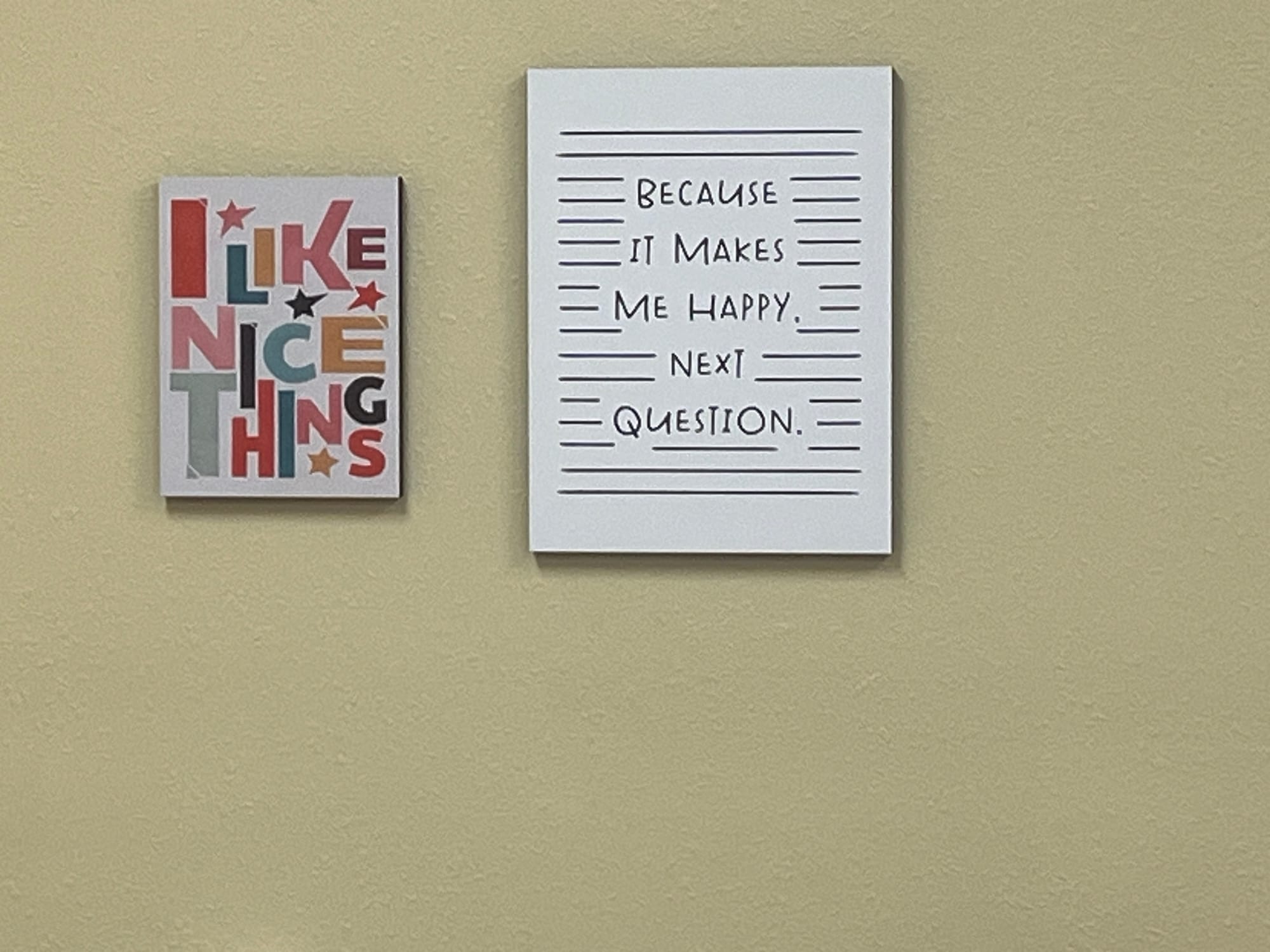
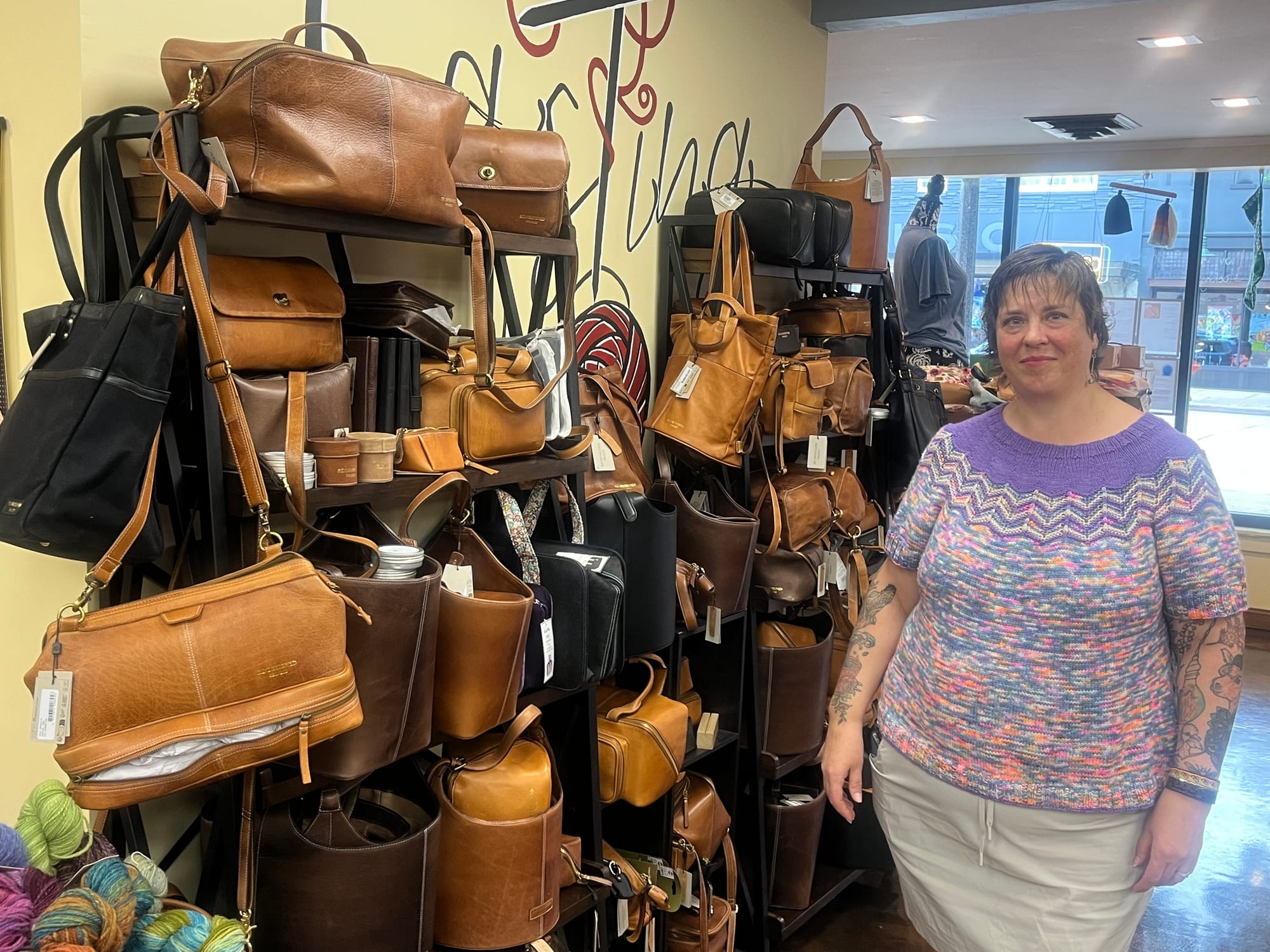
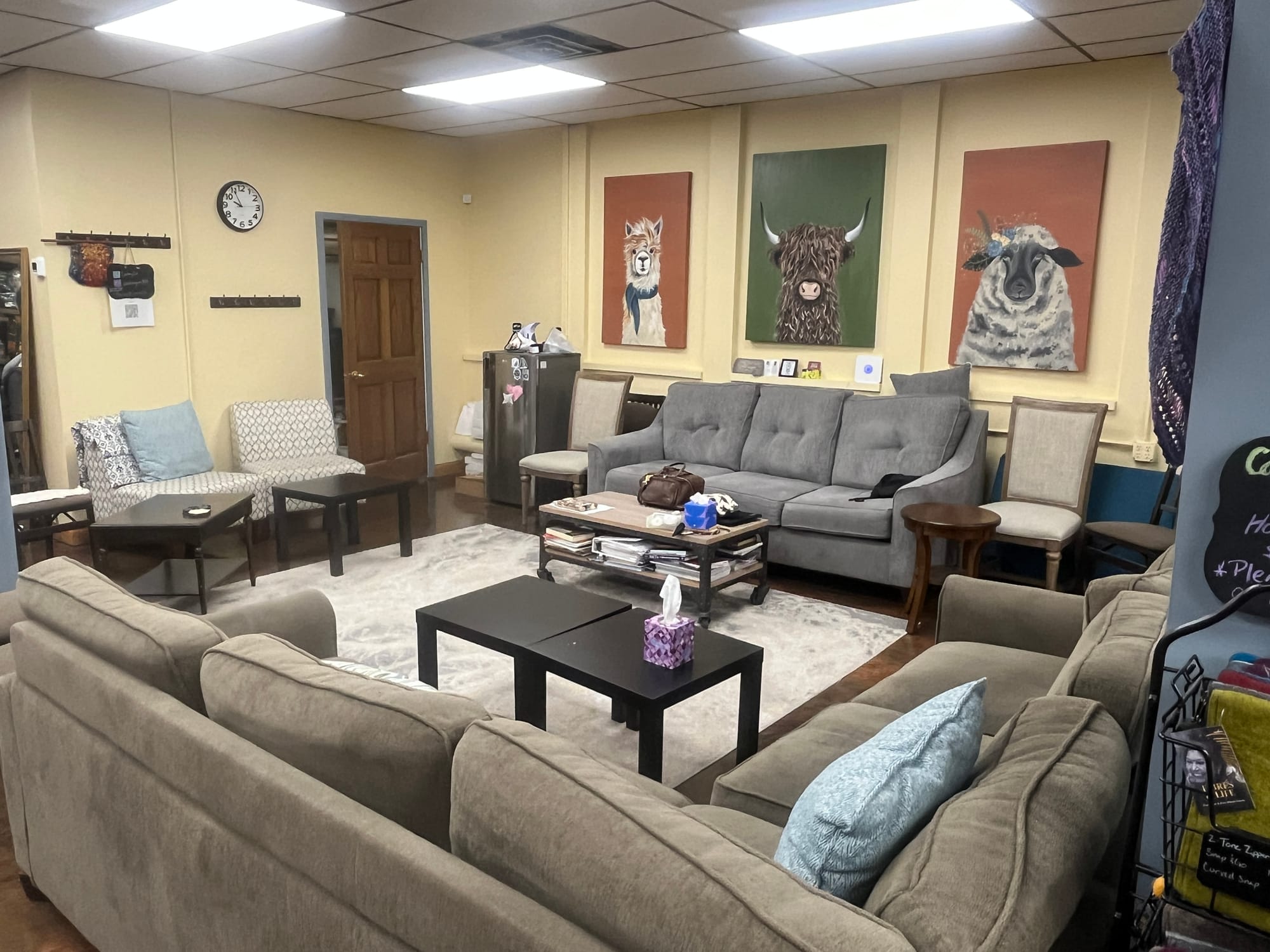
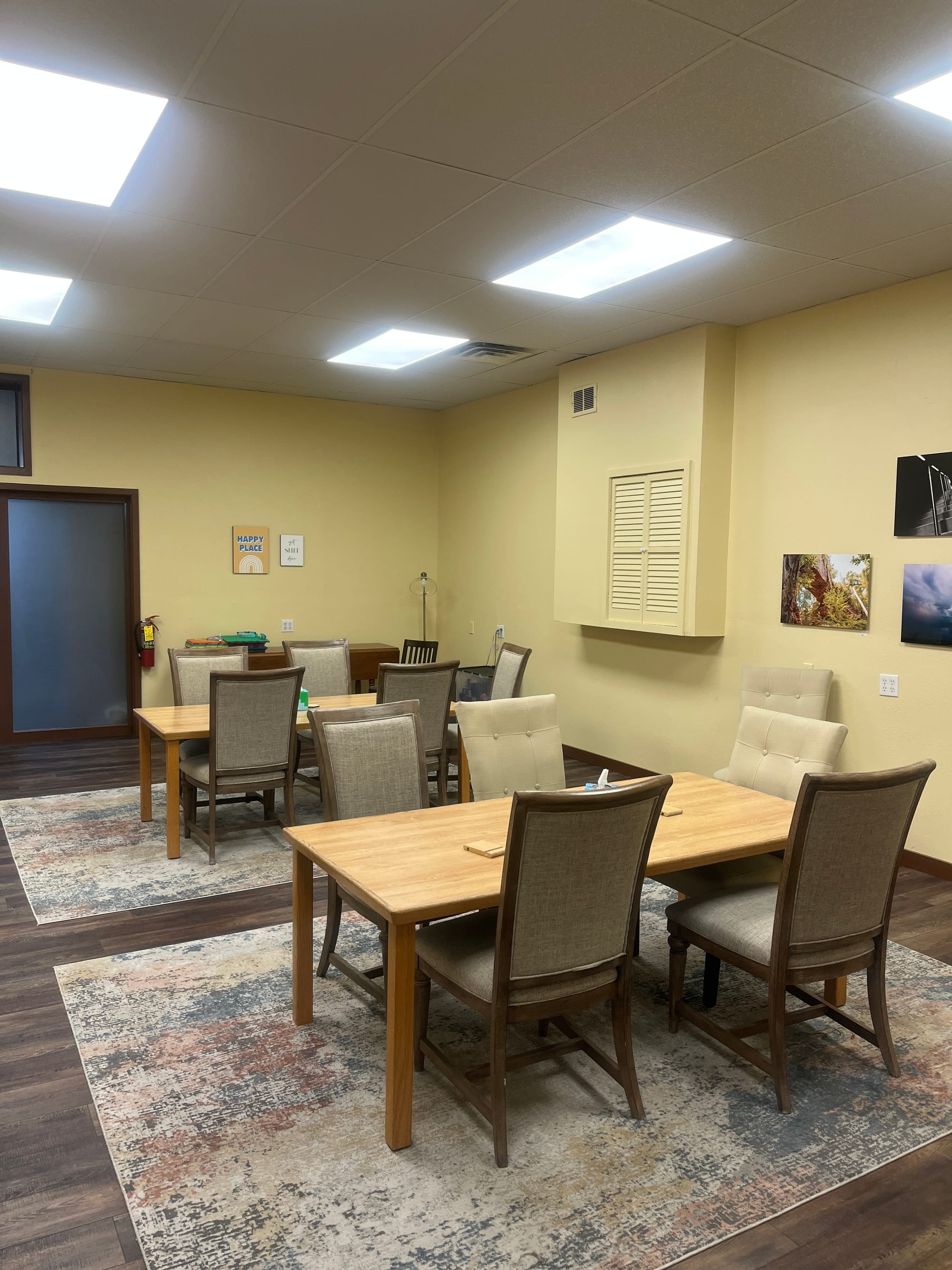
Clockwise from top left: posters in the teaching room at 'Casting On;' Project design bags, which figure to go up in price after President Trump added a 50 percent tariff on India, where the bags are made; the teaching room; the sitting room where knitting and crocheting enthusiasts gather every Sunday and Tuesday to work on and discuss their latest projects.
'Confusion over tariffs'
Rabideau gets almost all her yarn from abroad, primarily Peru, but also India, Portugal, Italy and Spain. She points out that with so few woolen mills and sheep herds in the United States, the cost of buying US product is prohibitive. End users of the yarn – her customers – simply are not going to pay the much higher cost for US-produced product, she says, and if she buys it, it winds up as unsold inventory.
Previously, thanks to a 2009 agreement, there were effectively zero tariffs on most Peruvian products entering the US, including on yarn. Trump has now put in place a 10 percent tariff on Peruvian imports, a whopping 50 percent on India and 15 percent on most European countries.
Trump’s decision late in August to add an additional 25 percent tariff on Indian imports – raising it to 50 percent – is already wreaking havoc on Rabideau’s ability to get product as well as potentially increasing the costs to consumers significantly.
“It already happened yesterday,” she said. “India is also where the majority of needles and hooks are made, and that's going to be interesting. I just got an order, a big order in last week trying to kind of beat that tariff system from my distributor, and a fifth of my order was missing because they're sold out because everyone else is trying to beat the tariffs, too.”
Casting On also sells project design bags, where crafters keep all their items for the latest project they are working on. Those all are made in India but come from Denmark, lending even more uncertainty as to the cost her store will pay if she can get the product. And DHL, an overseas shipping company, has partially stopped shipping to the US.
Sharing the added costs
Further impacting her business and small businesses around the country is the suspension by the administration of the De Minimis exemption on tariffs. De Minimis waived all tariffs on any shipment below $800. Now, with the suspension, no shipment – no matter how small the order – will escape the tariffs.
Now that the tariffs have become a reality consumers and businesses must live with, Rabideau has an economic decision to make: How much of the additional costs can her company afford to eat?
“So a lot of companies I’m working with are sharing some of the added costs of the tariffs,” she says. “So with the project design bags, they ate half of that and then I am eating half on my end and then raising the prices. And right on the price tag, I put, ‘this amount is the Trump tariff.’ I’m calling it like it is so that when folks come in they understand that, it’s not India paying the tariff. We’re paying the tariff.”
Rabideau is unabashedly progressive and projects a rainbow flag in her front window. She says she wants all members of the community to feel safe, adding that she’s never received any blowback from either the flag, her identification on the retail tags of “Trump tariff” or for her progressive views in general.
“We built this entire store, not to be a retail store, but to be a community,” she says. “I wanted to be able to have a place to go in and not do this at home alone in my living room. I want to learn from my elders or those younger than me. You know, like, you discovered a different way to do this (project)? Cool! Teach me!
“When you're doing this by yourself, and you don’t have the mom, the grandma, the aunties, the the generations before you that are teaching you this – which we don't have in this country anymore – you are missing a huge amount of knowledge. The Scandinavian countries, they're learning this stuff as soon as they're able to hold a stick. And it's just like general knowledge that's passed on and we don't get that here. So we need to build that. We need to have that community.”
'It would matter a lot'
Rabideau tears up just thinking about losing it all – the store, of course, but above all the community her store has fostered. She has hope that she can survive all the current headwinds that to her seem so frustrating, so avoidable.
“If we can't get product, or the product becomes too expensive and folks are already spending more at the grocery store, if they have less extra money to spend on their hobbies, then the sustainability of my business and other small businesses that rely on people having that extra income – we’re not going to survive it. Yeah, and then I own my building, so my backup plan was, if this fails, I have a building I can sell, but if no one else can afford to start a small business, then I sit with an empty building too.”
It would be an enormous blow for her way of life and sense of community if that were to happen, she says. “It would matter a lot if I lost this,” she says. “A lot.”
Tariffs threaten sense of community that 'Casting On' has always strived to foster © 2025 by Kelly Fenton is licensed under CC BY-NC-ND 4.0


